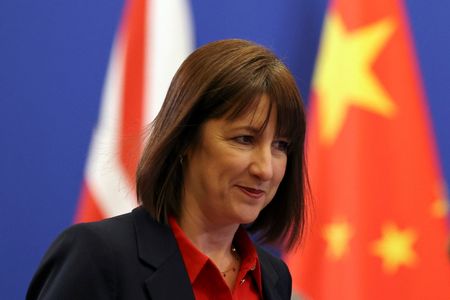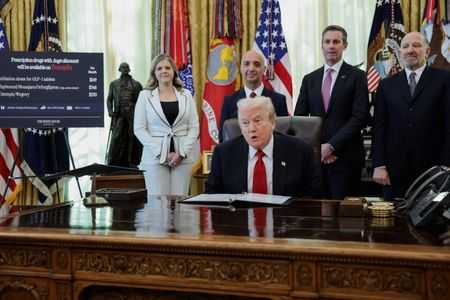By Andrea Shalal and Suban Abdulla
WASHINGTON/LONDON (Reuters) -Britain is set to have the fastest growth among major European economies this year, according to the International Monetary Fund, a boost to finance minister Rachel Reeves who is under pressure over a slowdown since her party came to power in July.
The IMF on Friday raised its forecast for British growth for 2025 by 0.1 percentage points to 1.6%, making it the third-strongest among the Group of Seven advanced economies after the United States and Canada.
The IMF outlook for British gross domestic product growth in 2026 remained at 1.5%, again the third-fastest in the G7 and unchanged from its October estimate.
IMF Chief Economist Pierre-Olivier Gourinchas said the “modest” growth upgrade reflected a net positive impact from Reeves’ first budget on Oct. 30 – as greater public investment would outweigh headwinds created by higher taxes – as well as rising household incomes and Bank of England rate cuts.
The BoE was likely to cut rates around once per quarter in 2025, he added.
Responding to the upgrade for 2025, Reeves said she would “go further and faster” to deliver economic growth.
The Bank of England forecast growth of 1.5% in 2025, partly reflecting a short-term boost to the economy from a temporary increase in public spending announced by Reeves on Oct. 30.
Last month, the Organisation for Economic Cooperation and Development also raised its forecast for British economic growth to 1.7% from 1.2% previously.
However, Reeves’ spending plans are based on forecasts from the government’s Office for Budget Responsibility which pencilled in growth of 2% for 2025 and 1.8% for 2026.
British government 30-year borrowing costs hit their highest since 1998 on Monday – the biggest losers in a global bond selloff driven by concerns about higher inflation and borrowing under the imminent presidency of Donald Trump.
But British bond prices recovered later in the week after weaker-than-expected British and U.S. inflation data and slower-than-expected GDP growth in November, the first month after Reeves set out her budget plan.
Reeves – whose future has been questioned by opposition lawmakers – doubled down on her budget decisions on Friday, saying they had been made in the national interest to put public finances back on “a firm footing”.
Britain’s economy stagnated in the third quarter of 2024, when the prospect of big tax rises in the Labour government’s budget hit companies, and the BoE estimates there was zero growth in the final quarter of 2024 too.
(Additional reporting by David Milliken; Editing by Toby Chopra and Alex Richardson)










